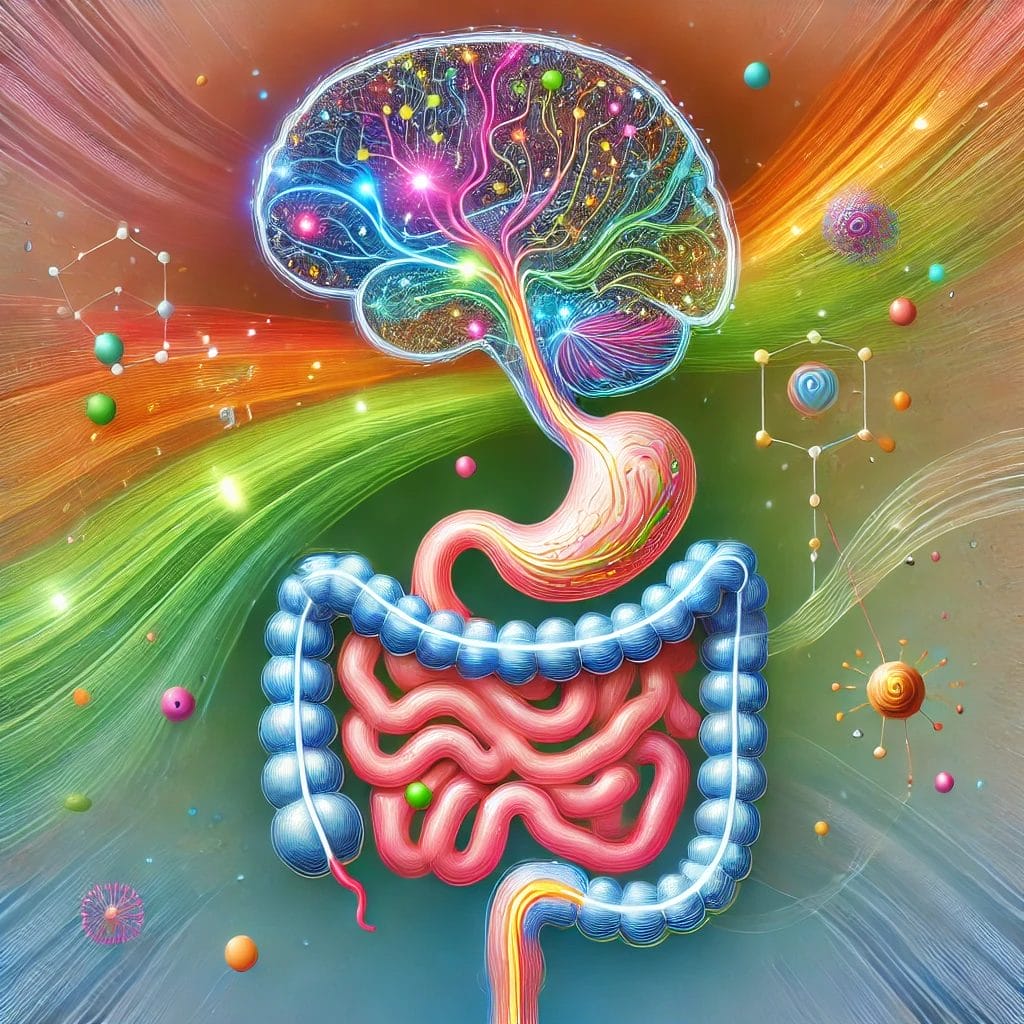Ever noticed how a cup of coffee can change your mood by lifting your spirits or how a heavy meal can make you feel sluggish?
It turns out that what we eat doesn’t just fuel our bodies—it plays a significant role in how we feel emotionally, too.
Food choices can either boost your mood or lead to mood swings, depending on what you consume.
From the gut-brain connection to the way certain foods influence our emotional well-being, diet is a powerful tool for maintaining both physical and mental health.
In this post, we’ll explore the impacts of diet on mood, the mental health benefits of healthy eating, and practical tips for incorporating these insights into your daily life.

Save and Share this article
The Science Behind Food and Mood
The connection between food and mood is real, and it starts in the gut.
Often referred to as the “second brain,” the gut is lined with millions of neurons and communicates directly with the brain through the vagus nerve.
This gut-brain connection plays a critical role in regulating emotions, making gut health essential for overall well-being.
Certain foods affect the production of neurotransmitters—chemicals like serotonin and dopamine that regulate mood.
For example, foods high in tryptophan, such as nuts, seeds, and tofu, help boost serotonin levels, often called the “feel-good” hormone.
By eating a diet that supports gut health and neurotransmitter production, you can enhance your emotional well-being.
On a cellular level, nutrient-dense foods support mood by maintaining the balance and function of our body’s systems.
Healthy eating for mood involves providing necessary vitamins, minerals, and antioxidants that our cells need to produce energy, repair themselves, and combat oxidative stress.
Balanced pH Levels:
A diet rich in fruits, vegetables, and whole grains helps maintain a slightly alkaline pH in the body. This balance is crucial for cellular function and can reduce inflammation, which is linked to emotional disorders like depression.

Energy Balance:
Foods that provide steady energy, such as complex carbs and healthy fats, help regulate blood sugar levels. Stable blood sugar prevents energy crashes and mood swings, which can happen when consuming refined carbs and sugars. We all know that without enough carbs, one might get hangry more easily. To avoid that grumpy feeling, focus on including whole grains and other complex carbohydrates in your meals.
Food Temperature and Energy:
Traditional alternative therapies, like Traditional Chinese Medicine (TCM), emphasize the importance of balancing “hot” and “cold” foods to maintain the body’s internal energy balance. According to TCM, an imbalance in these energies can affect mood and overall health.
Gut Health:
The variety and balance of gut bacteria (microbiome diversity) directly influence mood. A healthy gut helps produce neurotransmitters like serotonin, which regulates mood, sleep, and appetite. Testing your gut health can provide insights into how your diet impacts both your physical and emotional health.
Peer-Reviewed Studies:
- Jacka, F. N., et al. (2017). “A randomized controlled trial of dietary improvement for adults with major depression (the ‘SMILES’ trial).” BMC Medicine. This study found that participants who improved their diet experienced a significant reduction in depressive symptoms compared to those in a social support group.
- O’Neil, A., et al. (2014). “Relationship between diet and mental health in children and adolescents: A systematic review.” American Journal of Public Health. This review highlights the link between diet quality and mental health outcomes, emphasizing the importance of nutrition in emotional well-being.
Mental Health Benefits of Eating Healthy
Eating healthy offers numerous mental health benefits, including:
- Reduced Risk of Depression and Anxiety: Diets rich in whole foods—such as fruits, vegetables, and whole grains—can lower the risk of depression and anxiety. Consuming nutrient-dense foods supports brain function and helps emotional wellness.
- Improved Cognitive Function: Omega-3 fatty acids, found in foods like flaxseeds and walnuts, are essential for brain health. They help improve memory, focus, and overall cognitive function. A diet high in antioxidants, which fight oxidative stress, can also protect your brain from cognitive decline.
- Better Stress Management: Eating a balanced diet can help regulate cortisol levels, the hormone responsible for stress. When cortisol is balanced, you’re better equipped to handle daily stresses and keep your mood stable.

Top 5 Mood-Boosting Foods
- Leafy Greens (e.g., spinach, kale): Rich in folate, which helps produce mood-regulating neurotransmitters like serotonin.
- Berries (e.g., blueberries, strawberries): Packed with antioxidants that combat oxidative stress and inflammation, both linked to depression.
- Nuts and Seeds (e.g., walnuts, flaxseeds): High in omega-3 fatty acids, essential for brain health and mood regulation. Foods like chia seeds, flaxseeds, and walnuts can help reduce symptoms of depression and anxiety by supporting brain health and promoting anti-inflammatory effects.
- Whole Grains (e.g., oats, quinoa): Provide complex carbs that stabilize blood sugar and maintain steady energy levels, helping to prevent mood swings. Complex carbs keep you feeling good longer.
- Fermented Foods (e.g., sauerkraut, kimchi): Support gut health with probiotics, which can positively impact emotions and reduce anxiety.

Top 5 Foods That Can Negatively Impact Mood
- Refined Sugars (e.g., sugary snacks, sodas): Cause rapid spikes and drops in blood sugar, leading to mood swings and irritability. Over time, a diet high in refined sugars can contribute to increased feelings of depression and anxiety.
- Processed Foods (e.g., fast food, packaged snacks): Often low in nutrients and high in unhealthy fats, have been linked to higher rates of depression and anxiety. These foods often lack the essential nutrients your brain needs to function optimally, therefore, contributing to inflammation and poor mental health.
- Artificial Sweeteners (e.g., aspartame, sucralose): Linked to anxiety and emotional wellness in some studies due to their impact on brain function.
- Trans Fats (e.g., margarine, fried foods): Increase inflammation and have been associated with higher risks of depression.
- Excessive Caffeine (e.g., energy drinks, strong coffee): While caffeine can temporarily boost your mood, too much of it can lead to jitters, anxiety, and disrupted sleep, all of which can negatively affect mood.
Different Approaches to Healthy Eating
When it comes to making changes to your diet, there’s no one-size-fits-all approach.
Everyone’s journey is different, and what works for one person might not work for another.
Some people may prefer to plan out their meals in advance and make sweeping changes all at once, while others may feel more comfortable making small, gradual changes over time.
The key is finding what works best for you and making it sustainable.
Here are some practical steps to gradually introduce healthier eating habits:
Start by Cutting Out Added Refined Sugar:
Reducing or eliminating added sugars from your diet can have an immediate impact on your energy levels and mood stability.
Adjust Your Salt Intake:
Instead of cooking with salt, try adding it at the table so you can control the amount more easily. Over time, your taste buds will adjust, and you may find that you don’t need as much salt to enjoy your food.
Track Hydration:
Use a reusable water bottle to monitor how much water you’re drinking throughout the day. Staying hydrated is crucial for both physical and mental well-being.

As an Amazon Associate, I earn a small commission from qualifying purchases at no additional cost to you.
Incorporate More Whole Foods Gradually:
If a complete overhaul feels overwhelming, start by adding one whole food (like fruits, vegetables, or whole grains) to each meal. This way, you can slowly build healthier habits without feeling deprived.
Food Journaling:
Keep a journal or use Cronometer to track what you eat, how you feel after meals, and any changes in your mood or energy levels. This can help you identify patterns and make adjustments as needed.
I talked about how supplements may be necessary for one’s health after tracking what you eat. Take a look if you are serious about eating for your emotional wellness.
Gut Bacterial Testing
One of the most interesting aspects of how diet affects mood is the role of gut bacteria.
You can actually test your gut bacterial diversity to see how your diet is influencing your gut health.
The more diverse your gut bacteria, the better it is for your overall well-being, including emotional wellness.
After a few months of eating healthier, consider taking a simple test to assess changes in your microbiome.
This can offer valuable insights into how your dietary choices are affecting you physically and emotionally.
Practical Tips for Eating for Emotional Wellness
- Mindful Eating: Pay attention to how different foods make you feel, both physically and emotionally. Slowing down and savoring your meals can help you make more conscious food choices.
- Balanced Diet: Aim for a balanced diet that includes a variety of whole foods, such as fruits, vegetables, whole grains, nuts, and seeds. This variety ensures you’re getting the nutrients you need to support both physical and mental health.
- Meal Planning: Planning meals in advance can help ensure you’re incorporating mood-boosting foods into your diet. Focus on easy, plant-based recipes that nourish your body and mind.
- Listen to Your Body: Everyone’s body is different, so it’s important to listen to your own signals. If certain foods don’t make you feel good, it’s okay to adjust your diet accordingly.
- Stay Consistent: Consistency is key when it comes to maintaining a healthy diet. Try to establish a routine that works for you and stick with it, even if you’re making small changes over time.
Final Thoughts
The food we eat can have a profound effect on how we feel, both physically and emotionally.
By understanding the connection between diet and mood, you can make informed choices that support your overall well-being.
Whether you prefer to dive in with a full plan or make gradual changes, the journey to healthier eating is all about finding what works for you.
Start by incorporating more mood-boosting foods into your diet, keeping track of your progress, and staying consistent.
Remember, small changes can lead to big improvements in both your physical health and emotional wellness.
Share your favorite mood-boosting foods in the comments below, and don’t forget to subscribe to stay updated with more tips for a healthier, happier you!
Save and Share this article on your mood
Photo credit:
- “Healthy Food – Free For Commercial Use – FFCU” by Free for Commercial Use is licensed under CC BY-SA 2.0 ↩︎
- “Kimchi 김치” by Nagyman is licensed under CC BY-SA 2.0 ↩︎

Leave a Reply